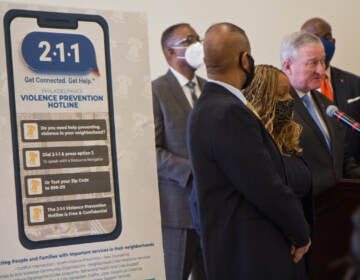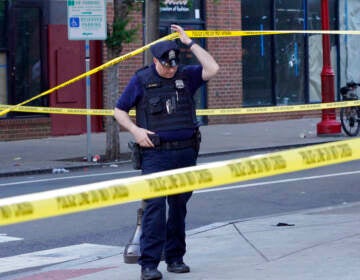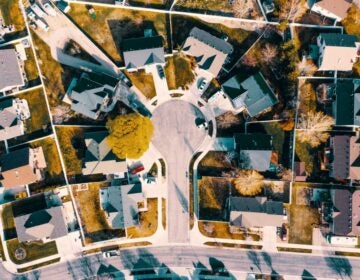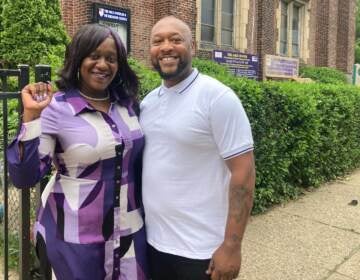Philly resumes gun violence listening tours. But what impact have they had?
Community members who attended the first round of listening tours in the spring say it’s not clear how their input will be used in the fight against gun violence.
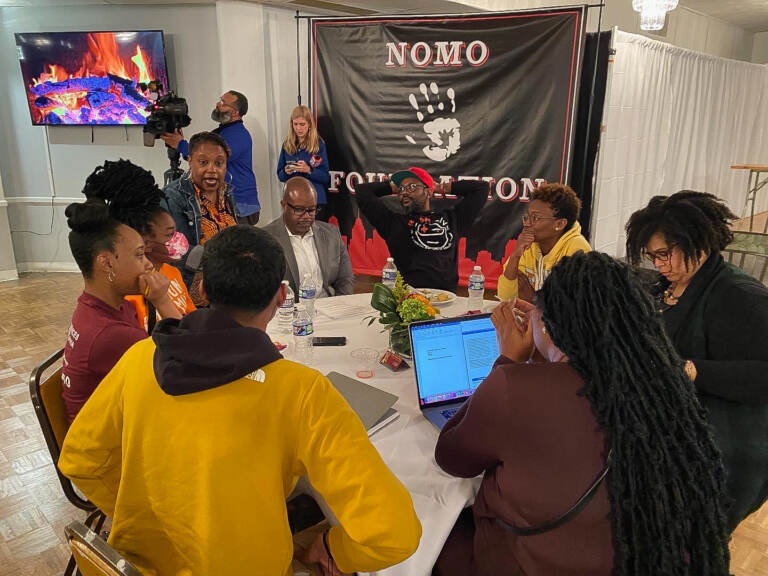
Philadelphia is continuing its ''Philadelphia Roadmap to Safer Communities'' listening tour to combat violence in the city. (City of Philadelphia)
Gilbert Coleman was part of a small group of Nicetown residents who met with city of Philadelphia staffers about gun violence this April. He told them that he and his neighbors are afraid to sit on their porches or run their errands because of the ongoing surge in shootings. He pleaded to law enforcement officers attending the meeting to do something.
About six months later, Coleman said he’s seen no change.
“I have not seen an increase in patrols in the area,” he said. “The police officers are still parked … but they seem to be just sitting there.”
He said he was hoping to see, if not direct action, some kind of implementation plan created from the feedback residents gave at the meeting. It was one of ten spring sessions included in the city’s “listening tour.” They launched the effort last March to collect input on their 2019 Roadmap to Safer Communities, a five-year plan for reducing shootings.
Now they’re holding another round of listening sessions running through Sept.15, with a focus on neighborhoods they didn’t touch the first time, but some residents say more discussion isn’t the way to address the daily fatalities in hard-hit communities.
“The action plan should have been drawn up,” Coleman said. “To have the meetings again and just be listening again, that’s going to prolong the agony of the people in the neighborhood. It doesn’t change for them.”
Philadelphians affected by gun violence often call out city officials for not more urgently addressing the gun violence crisis, and there’s been a continued push for Mayor Jim Kenney to declare the issue an emergency. A recent survey from nonprofit group Frontline Dads found that 96% of residents think the city leadership “could do more to stop gun violence” and 89% say city leadership has never asked them for suggestions on how to address the problem. Activists have also asked for more evaluation of city-funded programs.
View this post on Instagram
Erica Atwood, director of the city’s Office of Policy and Strategic Initiatives for Criminal Justice and Public Safety, said staff are currently going over the input from residents and will release an implementation plan in the future, but did not have a ballpark date.
“Phase two of going out and listening is really about how do we implement what we heard, or really integrate what we heard from the community, into what we’re doing?,” she said.
She added that simply encouraging city staffers and residents to break bread together and share ideas is valuable.
“There’s never enough time being spent with impacted communities by those of us who are in positions of power,” she said. “It helps inform us to make better decisions on behalf of others.”
At the listening sessions, attendees are typically broken into small groups and placed at tables, where a city representative asks them to propose solutions.
George Waters with the nonprofit Men Who Care Germantown attended a session at a church in March.
“Putting right minds together and making something productive come out of the conversation is what they’re looking for, but no one has a real answer to a lot of these situations going on daily,” he said. “But it’s definitely worth the effort, and maybe one day you can sit down and say I was part of this and we did our best.”
He said he’d like to see more afterschool programs and job placement for young people, and more public investment to combat poverty. He said he doesn’t have high expectations for big changes out of the meetings, but he did appreciate the networking component.
“I met some people that I never probably would have met, so that was important to me.”
The listening sessions were initially supposed to include updates on the roadmap, but that wasn’t the focus of any of the six meetings that WHYY News attended.
At the first of the fall sessions, city officials distributed a packet containing updates on the $184 million anti-violence spending in the FY 2022 budget.
Impacts as of Dec. 31, 2021, included:
- 14% reduction in shooting victims and 1% increase in gun homicides in the city’s “Operation Pinpoint” areas
- 13% of PPD officers equipped with mobile devices for use on foot patrols
- 9% increase in investigative leads from forensic databases
- 110 “direct engagements” with people engaged in violence, including 33 connections to services
- 1,918 “contacts” in hotspot crime areas
- 282 anti-retaliation negotiations
- 1,070 people trained for transitional jobs
- 1,206 crisis intervention response team calls taken, including 465 connections to behavioral health
The city also tracked the impacts of their youth behavioral health and restorative justice programs and their neighborhood improvement efforts, which included demolishing abandoned buildings and cleaning and maintaining vacant lots.
Nonprofit director Donnell Drinks attended a session in North Philly in March. He said he’s noticed the city making more outreach efforts to residents in the last six months, but there hasn’t been enough follow-through.
“I would never say it’s a bad thing when you give the community an opportunity to be heard and speak, I just hope they’re more receptive to the messages that are given,” he said.
He said he’s still not seeing long-term investments that grassroots groups have asked for.
The city doles out grant funding for nonprofits, but they’re mostly short-term awards that need to be re-applied for, and many groups find the process onerous.
As for the meetings, Drinks also said the city should increase its recruitment efforts to try to get more residents to attend. The city says there were 300 participants over the ten spring sessions, which included virtual attendees.
Atwood’s office is currently hiring a communications firm to “inform residents about efforts of the Philadelphia Police Department, Office of Policy and Strategic Initiatives for Criminal Justice & Public Safety, and the Philadelphia Public Health Department,” and “promote communications related to violence prevention initiatives and resources available to Philadelphians,” including promotion of the roadmap.
Sam Searles contributed reporting.
If you or someone you know has been affected by gun violence in Philadelphia, you can find grief support and resources here.

Get daily updates from WHYY News!
WHYY is your source for fact-based, in-depth journalism and information. As a nonprofit organization, we rely on financial support from readers like you. Please give today.


